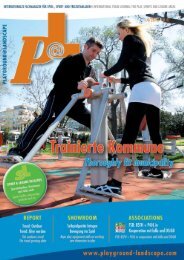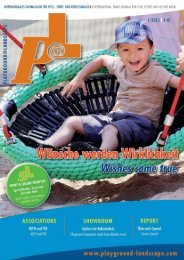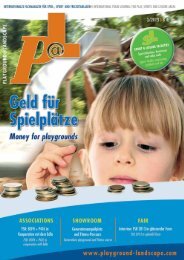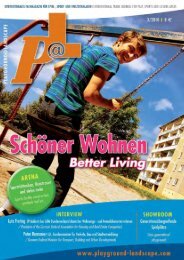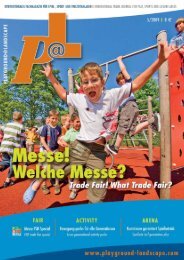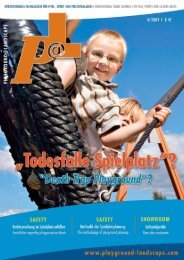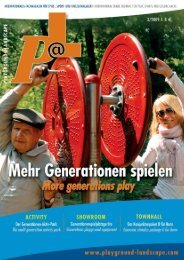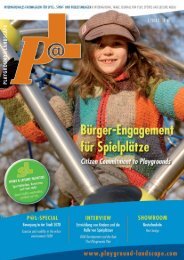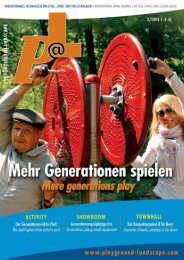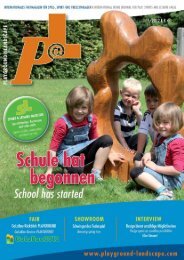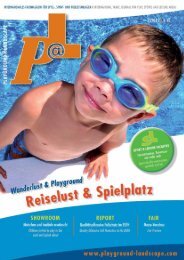Download - Playground@Landscape
Download - Playground@Landscape
Download - Playground@Landscape
Erfolgreiche ePaper selbst erstellen
Machen Sie aus Ihren PDF Publikationen ein blätterbares Flipbook mit unserer einzigartigen Google optimierten e-Paper Software.
ACTIVITY<br />
developmental processes specified in the literature were identified<br />
and, on the basis of interpretation, were defined in the form of the<br />
following four main categories or fields (for more details, cf. Bahr et<br />
al., 2012, p. 98ff).<br />
a) Exercise as a taught subject<br />
The main focus here is on providing instruction in exercise. The<br />
purpose of this separate educational field is to facilitate the acquirement<br />
by children of the physical motor skills that will enable them<br />
to participate in the activities of exercise, play and sport. In addition<br />
to standard concepts with regard to the training of elementary motor<br />
abilities (conditional and coordinating skills), particular attention is<br />
paid to making children proficient in the basic activities essential to<br />
their psychological and educational development, such as gripping,<br />
walking, running, jumping, climbing, throwing etc.<br />
b) Exercise as part of health education<br />
Here the underlying concept is that if children are helped to acquire a<br />
positive attitude towards exercise, play and sport at an early age, they<br />
are less likely to subsequently suffer from motor maldevelopment and<br />
lifestyle diseases. The standard preventative measures, such as<br />
fitness, posture and strengthening exercises, are discussed in this connection.<br />
More recent theories stress the salutogenic, resource-orientated<br />
purpose of exercise: it is postulated that procedures designed to<br />
promote both physical and psycho-emotional wellbeing will stimulate<br />
resources that will contribute towards the healthy development of<br />
the personality as a whole. This innovative approach perceives<br />
exercise as one element within a holistic concept of health that involves<br />
physical, emotional, social and environmental factors – not<br />
forgetting the important role played by healthy diet.<br />
c) Exercise as a means of learning<br />
The basic idea here is that the experience of exercise as part of learning<br />
can provide children with the capacity to act and form strategies<br />
that will have a positive effect on their general ability to perform and<br />
learn in the school environment. Consequently, the main interest is<br />
on exercise-related precursor skills and the relevance of exercise and<br />
performance capacity to the other educational components of the curricula<br />
at the kindergarten and primary school level.<br />
d) Exercise as a means of promoting development<br />
This concept proposes that exercise has a fundamental and consolidating<br />
function that is relevant to all developmental processes (cognitive,<br />
social, emotional and physical). This means that the experience<br />
of exercise has a categorical role to play in a child’s acquirement<br />
of the skills relating to self-perception, social interaction, interaction<br />
with the physical world and performance capacity that it needs to<br />
establish a healthy relationship with the world around it. Through<br />
exploration and exercise, a child can become the engineer of its own<br />
development. As a result, aspects of the evolution of the self and the<br />
personality are at the core of the corresponding discussions.<br />
Subsequently drawn up were differentiated terminology lists that<br />
represented each concept and that could thus be used to reveal<br />
Wieso ist denn<br />
unser Spielplatz<br />
www.riedelundeichler.de<br />
Finn, 5 Jahre<br />
Könnte hier von Ihrem Spielplatz die Rede sein?<br />
Machen Sie Ihren Spielplatz für die Kids wieder interessant -<br />
rufen Sie uns an und informieren Sie sich über die vielfältigen<br />
Möglichkeiten, die Pieper Holz Ihnen bietet!<br />
nicht so toll wie<br />
der bei Jannis??<br />
Wir können<br />
Ihnen helfen:<br />
Ihre Spielplatz-<br />
Notfall-Nummer:<br />
+49 (0) 29 62 / 97 11-35<br />
PIEPER HOLZ GmbH · D-59939 Olsberg · eMail: post@pieperholz.de · www.PieperHolz.de<br />
67



